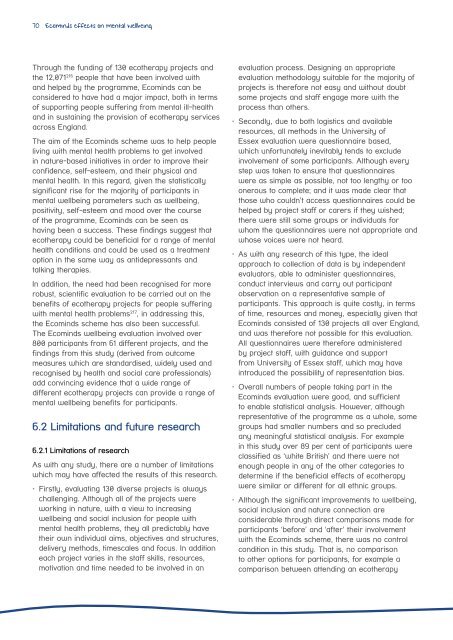Ecominds-effects-on-mental-wellbeing-evaluation-report
Ecominds-effects-on-mental-wellbeing-evaluation-report
Ecominds-effects-on-mental-wellbeing-evaluation-report
Create successful ePaper yourself
Turn your PDF publications into a flip-book with our unique Google optimized e-Paper software.
70 <str<strong>on</strong>g>Ecominds</str<strong>on</strong>g> <str<strong>on</strong>g>effects</str<strong>on</strong>g> <strong>on</strong> <strong>mental</strong> <strong>wellbeing</strong>Through the funding of 130 ecotherapy projects andthe 12,071 216 people that have been involved withand helped by the programme, <str<strong>on</strong>g>Ecominds</str<strong>on</strong>g> can bec<strong>on</strong>sidered to have had a major impact, both in termsof supporting people suffering from <strong>mental</strong> ill-healthand in sustaining the provisi<strong>on</strong> of ecotherapy servicesacross England.The aim of the <str<strong>on</strong>g>Ecominds</str<strong>on</strong>g> scheme was to help peopleliving with <strong>mental</strong> health problems to get involvedin nature-based initiatives in order to improve theirc<strong>on</strong>fidence, self-esteem, and their physical and<strong>mental</strong> health. In this regard, given the statisticallysignificant rise for the majority of participants in<strong>mental</strong> <strong>wellbeing</strong> parameters such as <strong>wellbeing</strong>,positivity, self-esteem and mood over the courseof the programme, <str<strong>on</strong>g>Ecominds</str<strong>on</strong>g> can be seen ashaving been a success. These findings suggest thatecotherapy could be beneficial for a range of <strong>mental</strong>health c<strong>on</strong>diti<strong>on</strong>s and could be used as a treatmentopti<strong>on</strong> in the same way as antidepressants andtalking therapies.In additi<strong>on</strong>, the need had been recognised for morerobust, scientific evaluati<strong>on</strong> to be carried out <strong>on</strong> thebenefits of ecotherapy projects for people sufferingwith <strong>mental</strong> health problems 217 , in addressing this,the <str<strong>on</strong>g>Ecominds</str<strong>on</strong>g> scheme has also been successful.The <str<strong>on</strong>g>Ecominds</str<strong>on</strong>g> <strong>wellbeing</strong> evaluati<strong>on</strong> involved over800 participants from 61 different projects, and thefindings from this study (derived from outcomemeasures which are standardised, widely used andrecognised by health and social care professi<strong>on</strong>als)add c<strong>on</strong>vincing evidence that a wide range ofdifferent ecotherapy projects can provide a range of<strong>mental</strong> <strong>wellbeing</strong> benefits for participants.6.2 Limitati<strong>on</strong>s and future research6.2.1 Limitati<strong>on</strong>s of researchAs with any study, there are a number of limitati<strong>on</strong>swhich may have affected the results of this research.• Firstly, evaluating 130 diverse projects is alwayschallenging. Although all of the projects wereworking in nature, with a view to increasing<strong>wellbeing</strong> and social inclusi<strong>on</strong> for people with<strong>mental</strong> health problems, they all predictably havetheir own individual aims, objectives and structures,delivery methods, timescales and focus. In additi<strong>on</strong>each project varies in the staff skills, resources,motivati<strong>on</strong> and time needed to be involved in anevaluati<strong>on</strong> process. Designing an appropriateevaluati<strong>on</strong> methodology suitable for the majority ofprojects is therefore not easy and without doubtsome projects and staff engage more with theprocess than others.• Sec<strong>on</strong>dly, due to both logistics and availableresources, all methods in the University ofEssex evaluati<strong>on</strong> were questi<strong>on</strong>naire based,which unfortunately inevitably tends to excludeinvolvement of some participants. Although everystep was taken to ensure that questi<strong>on</strong>naireswere as simple as possible, not too lengthy or too<strong>on</strong>erous to complete; and it was made clear thatthose who couldn’t access questi<strong>on</strong>naires could behelped by project staff or carers if they wished;there were still some groups or individuals forwhom the questi<strong>on</strong>naires were not appropriate andwhose voices were not heard.• As with any research of this type, the idealapproach to collecti<strong>on</strong> of data is by independentevaluators, able to administer questi<strong>on</strong>naires,c<strong>on</strong>duct interviews and carry out participantobservati<strong>on</strong> <strong>on</strong> a representative sample ofparticipants. This approach is quite costly, in termsof time, resources and m<strong>on</strong>ey, especially given that<str<strong>on</strong>g>Ecominds</str<strong>on</strong>g> c<strong>on</strong>sisted of 130 projects all over England,and was therefore not possible for this evaluati<strong>on</strong>.All questi<strong>on</strong>naires were therefore administeredby project staff, with guidance and supportfrom University of Essex staff, which may haveintroduced the possibility of representati<strong>on</strong> bias.• Overall numbers of people taking part in the<str<strong>on</strong>g>Ecominds</str<strong>on</strong>g> evaluati<strong>on</strong> were good, and sufficientto enable statistical analysis. However, althoughrepresentative of the programme as a whole, somegroups had smaller numbers and so precludedany meaningful statistical analysis. For examplein this study over 89 per cent of participants wereclassified as ‘white British’ and there were notenough people in any of the other categories todetermine if the beneficial <str<strong>on</strong>g>effects</str<strong>on</strong>g> of ecotherapywere similar or different for all ethnic groups.• Although the significant improvements to <strong>wellbeing</strong>,social inclusi<strong>on</strong> and nature c<strong>on</strong>necti<strong>on</strong> arec<strong>on</strong>siderable through direct comparis<strong>on</strong>s made forparticipants ‘before’ and ‘after’ their involvementwith the <str<strong>on</strong>g>Ecominds</str<strong>on</strong>g> scheme, there was no c<strong>on</strong>trolc<strong>on</strong>diti<strong>on</strong> in this study. That is, no comparis<strong>on</strong>to other opti<strong>on</strong>s for participants, for example acomparis<strong>on</strong> between attending an ecotherapy



